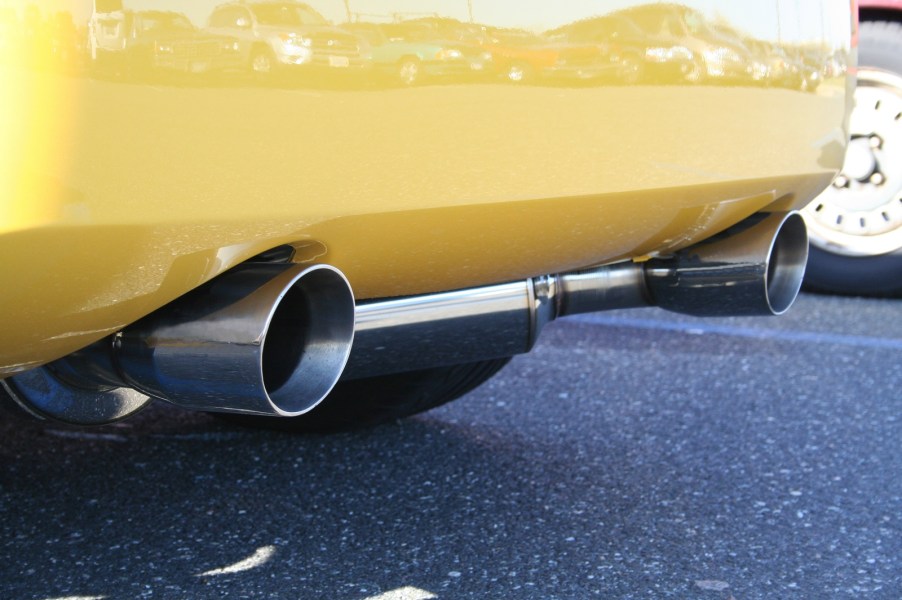
People Who Like Loud Cars Might Be Sadists or Psychopaths, Study Says (And Why It’s Partial BS, IMO)
The results of a pilot psychology study are making the rounds this week. It’s titled, “A desire for a loud car with a modified muffler is predicted by being a man and higher scores on psychopathy and sadism.” As you can imagine, some automotive enthusiasts are upset. And I support them.
Early psychology study results connect loud exhaust to malicious personality traits
Julie Aitkin Schermer is a professor in the Departments of Psychology and Management and Organizational Studies at The University of Western Ontario in London, Canada. She published the results of the pilot study she conducted on more than 500 undergraduate students. All of them were declared Business majors. More than half of the students were men.
All of the participants were asked a series of questions about cars. These included whether they thought of their cars as an extension of themselves. It also asked if they felt loud cars were rad. Finally, they answered whether they’d like to modify their exhaust systems to make their cars louder.
Next, they were given a specific personality questionnaire called the Short Dark Tetrad (SD4). The questions helped determine if the respondents were prone to any of four social disorders. The gamut of personality types the quiz identifies includes Machiavellianism, narcissism, psychopathy, and sadism.
Schermer was expecting narcissism to come up in the results. However, she found that in lining up the participants who liked loud cars, many fell into the “male + psychopath or sadist” categories. Enough of them to title her pilot study as such, anyway.
“It seems to be this callous disregard for other people’s feelings and their reactions. That’s the psychopathy coming out,” she told Colin Butler of CNBC News. “They probably get a kick out of enjoying watching people get startled.”
Car enthusiasts disagree. Obviously.
Obviously, plenty of car enthusiasts are twisted up over the stereotype. To contrast the study, Butler interviewed a female custom shop owner. She disagreed entirely with the study. On top of that, she offered several examples of how she and her clients are thoughtful, caring car lovers. To her, they all just enjoy working on and driving certain vehicles with modifications.
Schermer seems to insist that the study exposed more of a “general” group who are not necessarily enthusiasts. These non-enthusiasts choose to make their cars loud in order to disregard legalities and have zero concern for others in doing exhaust mods. In fact, they do it just to bother other people.
“The personality profile I found with our loud mufflers are also the same personality profiles of people who illegally commit arson,” Schermer told CNBC. “I’m sure the older, retired gentlemen who are making their classic cars louder and more noticeable are also not going out and setting fires illegally.”
Oh, so it’s a certain type of modifier we should be wary of. Let’s be careful here, lest we make our way into profiling. The young men who screech their tires are out setting fires?

Why we should tread lightly with this study
Let’s keep in mind that according to the American Psychological Association, only about 1% of the world’s population has severe psychopathy. Look, while I’ve definitely been disturbed by loud cars over the years and find some of that behavior indeed antisocial, I fully support the custom shop owner’s viewpoint.
In my mind, there are three different sets of modifiers. Sure, there are those who hack up their stock car in a backyard way. And sure, they do it to sound aggressively threatening because they are posturing aggression.
Others are perhaps getting into “cars” and start with easy exhaust mods, performance brakes, K&N filters, rims, stereos, etc. Those folks play around with sound. They’re acting more for the fun of it and learn a lot along the way.
Third are seasoned car enthusiasts and builders who do the work out of love for the machine. What’s more, they do it for the love of other enthusiasts and their communities. They’re often nostalgic. Maybe they have (or had) a close, meaningful relationship with someone who served as a mentor. Maybe the mentor is or was a beacon of light and hope to them, who also enjoyed rumbly cars.
I don’t think it’s fair to extrapolate Schermer’s study to any automotive enthusiast or group of drivers. What’s more, it can be dangerous for any person to be labeled (read: profiled) as having malicious personality traits just because they drive a modified car.
I’m not arguing against any established emissions law or noise ordinance, nor am I denying the study’s collected data if it’s valid. I’m just saying that it shouldn’t mean that anyone who likes loud cars is a socially disturbed psycho.



